Sweden Calls For Immediate Release Of EU Diplomat Jailed In Iran

Sweden has demanded the immediate release from jail in Iran of an EU diplomat who has been accused of spying.

Sweden has demanded the immediate release from jail in Iran of an EU diplomat who has been accused of spying.
Johan Floderus, 33, is being held in Tehran’s Evin prison ahead of a trial on charges of spying for Israel and "corruption on earth," a crime punishable by death.
Speaking on Monday, Swedish Prime Minister, Ulf Kristersson said the charges against Floderus are “completely without factual basis”.
He told a press conference in Stockholm: “We demand his immediate release.
We have very intensive work we are showing Iran on this issue. But I will not be going into anything of the contents of that work.”
Floderus was arrested while on holiday in Iran last year. His family insists that the detention lacks justifiable cause or due process.
The situation has sparked concerns among human rights organizations and Western governments, who allege that Iran is leveraging arrests on security charges for political motives. Despite the accusations, Tehran claims that such detentions adhere to its criminal code and are devoid of political motivations.
Diplomatic tensions between Sweden and Iran have risen since 2019, stemming from Sweden's arrest and subsequent life sentence of former Iranian official Hamid Nouri. He was convicted of participating in mass executions and torture of political prisoners in the 1980s. In response, Iran protested by recalling its envoy to Sweden.
In May, Iran carried out the execution of a Swedish-Iranian dissident accused of leading an Arab separatist group. The dissident was alleged to be implicated in attacks including one on a 2018 military parade that claimed 25 lives.

Iranians are posting dance videos on social media in support of a man who is being prosecuted for singing and dancing in the street and posting the videos on Instagram.
The fishmonger, Sadegh Bagheri (aka Boughi) in his late sixties, became an Instagram celebrity in recent months after videos of his folk songs and dance at the bazaar in the city of Rasht, a Caspian coastal city in northern Iran, went viral on social media.
Bagheri’s dance attracted the attention of shoppers who often circled around him and his fishmonger friends, clapped to the music, and sometimes joined in the happy dance.
Last week, police reportedly detained not only Bagheri, but also a dozen other Instagram influencers in Rasht for posting Bagheri’s videos. Authorities also took over the accounts of these individuals, removed all content and posted a notice that said the activity of these accounts had been aborted for “criminal content”.
Immediately after authorities shut down the fishmonger’s Instagram page, social media users posted tens of videos that showed people dancing in parks and streets to the same tune to show their solidarity with Bagheri.
Spectators joining in Bagheri performance outside his shop
Dancing is considered as debauchery by religious fundamentalists and hence falls under the category of completely unacceptable behavior. The fundamentalist religious establishment that has very close ties to political hardliners in power also strongly objects to most music, particularly lively pop music usually associated with dance.
The deputy police commander of Gilan Province, Brigadier-General Hossein Hassanpour, told the media that police had acted because the distribution of the videos of Bagheri’s dance in the bazaar of Rasht in social media had “violated public morals” and “broke norms”.
Four shops involved in the singing and dancing were shut down, too, he added.
Many have pointed out on social media that authorities did not take legal action against officials in the same city who were involved in a same-sex scandal or object to the state broadcaster’s employment of celebrities whose lifestyles are completely against the establishment’s proclaimed morality. Instead, they arrest people like the “happy old man” for dancing outside his shop, claiming that the society’s morality was under attack.
Girls imitating Bagheri’s happy dance in a park
Boundaries of what music is acceptable in the Islamic Republic and what is not are very murky. Iran has a national orchestra and numerous concerts are held across the country every year but due to the objection of the religious establishment in over four decades the state broadcaster has never shown any actual musical instruments or orchestras in action.
Politically influential fundamentalist religious leaders such as the imam of the religious city of Mashhad often dictate the rules in their territories. A concert held in Tehran and other cities without any problems, therefore, can easily be cancelled in a city such as Mashhad. These fundamentalists are backed by Supreme Leader Ali Khamenei and imams, such as the fiery Ahmad Alamolhoda in Mashhad have been appointed by the 84-year-old ruler.
The action taken against the singing and dancing fishmonger in Rasht is said to have been prompted by the city’s Friday imam.
Animation celebrating Bagheri’s happy dance
Pointing out that all institutions of power in the country are currently in the hands of like-minded officials, a commentary in the reformist Ham-Mihan newspaper argued that a “single entity” is responsible for everything that is happening in the country now such as the arrest of the “happy old [dancing] man”, the Mashhad subway CCTV scandal, and Tehran subway “horror tunnels”.
By suppressing people, the “single entity” that has control over all institutions of power, the commentary in Ham-Mihan said, is sending a message to all, clear and with no reservation, that it determines everything that people are allowed or forbidden to do. “You can dance when I tell you.
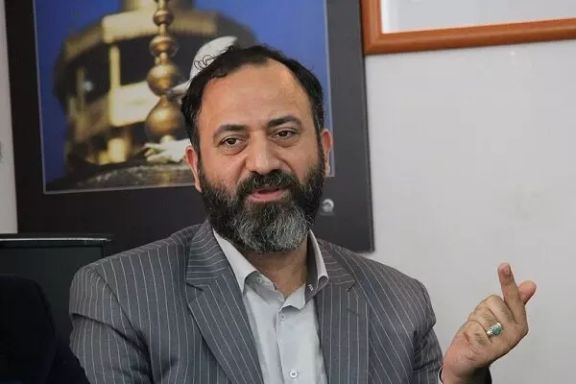
A former hijab watchdog official is being detained facing a possible death sentence for homosexuality after a video showed him having sex with another man.
Reza Seqati, the former director-general of the culture ministry in Gilan province, is being held in detention, according to Mizan News Agency, affiliated with the Iranian judiciary.
On Monday, the criminal court in Tehran issued the detention order after investigating and evaluating the case.
In July, Seqati was dismissed from his official post after a video showing him engaging in sex with an unidentified man surfaced, potentially leading to the death penalty under Iranian law. Mizan referred to the video as the "indecent film in the Gilan case" and verified Seqati's involvement.
Senior Iranian lawmaker Hassan Norouzi called for the death penalty for Seqati in October, saying. "If the allegations against Reza Seqati are substantiated, there is an unequivocal necessity for imposing stringent consequences. He must face the full force of the law and be shoved off the mountain and be killed to teach a lesson to others."
Seqati, reported to be married with three daughters, was once recognized as a fervent supporter of compulsory hijab regulations in Gilan. Back in May, he declared the inauguration of a hijab hypermarket in the province and initiated efforts to set up a hijab exhibition at Rasht's central exhibition hall, emphasizing the production of clothing aligning with "Iranian-Islamic culture."
Reports last month hinted at Seqati assuming a new position, which the ministry promptly denied.
Some speculate that Seqati's arrest, several months after the incident, is a response to public criticism regarding the lack of arrests in the Debsh tea corruption case. Allegedly involving the embezzlement of funds from the Debsh Tea Company, the $3.5 billion corruption scandal implicates ministers of agriculture and industry, as well as the heads of the Central Bank of Iran and Iranian Customs Administration.

The daughter of a German-Iranian US citizen who has been sentenced to death in Iran has called on Washington and Berlin to “take action” and save her father.
Jamshid Sharmahd, a 68-year-old software developer and California resident, was allegedly abducted during a visit to the United Arab Emirates in 2020 and forcibly taken to Iran.
In April, the Iranian judiciary sentenced him to death on charges of "spreading corruption on Earth," a verdict upheld by Iran's Supreme Court.
His family vehemently denies the allegations, and Amnesty International has condemned the trial as a sham.
At the end of last week, German officials disclosed that Foreign Minister Annalena Baerbock had held discussions about Germans detained in Iran with her Tehran counterpart, Hossein Amir-Abdollahian.
On Sunday, Jamshid’s daughter Gazelle Sharmahd responded, tweeting: “I have requested an input from the German Government regarding what was discussed about the hostages in Iran, in particular about my father Jamshid Sharmahd.”
In remarks targeted at US President Joe Biden, she said: “What are you doing for the US hostages after you handed the Islamic regime $6 billion, and still couldn’t save all US nationals like my dad. We are still waiting for you to take action. Action that won’t further threaten my dad‘s life and won’t further empower his kidnappers.”
She earlier expressed frustration with the passing of responsibility between Germany and the US, stating, "The issue is tossed back and forth, with each side claiming 'not my citizen,' 'not my jurisdiction.' And we're not getting through to them."
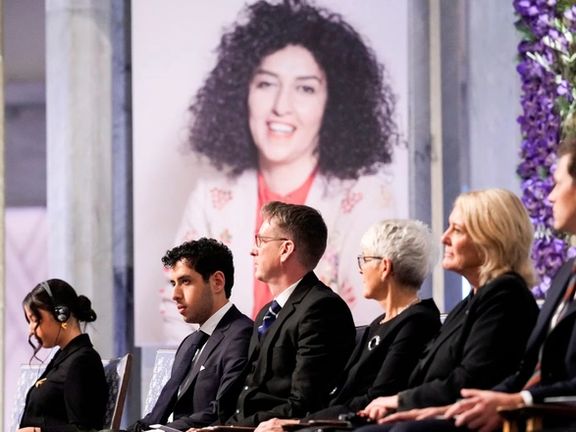
Nobel Peace Prize winner Narges Mohammadi, imprisoned in Tehran, has criticized Western governments for their half-hearted support for Iranians who fight for democracy and human rights.
In her acceptance speech –sent from the notorious Evin prison, read by her teenage daughter in Oslo– Mohammadi said the Islamic Republic is in a state of “unstable equilibrium” with very little popular support, and will give way to democracy sooner rather than later.
“But the reality is,” she added, “that [foreign] governments and the UN have not had the conviction, the practical coherence, and the proactive approach that seemed necessary and fitting for the kind of support that wills the victory of the people of Iran.”
Iranian dissidents often cite lack of foreign support as a contributing factor to their nonsuccess in getting rid of the Islamic Republic. When it comes to defining the nature and the scope of such support, Western governments are mostly unclear and divided, dissidents argue.
“Western governments should not delay democracy and human rights by adopting confused strategies that are concerned with the continuation of the Islamic Republic's rule,” Mohammadi said.
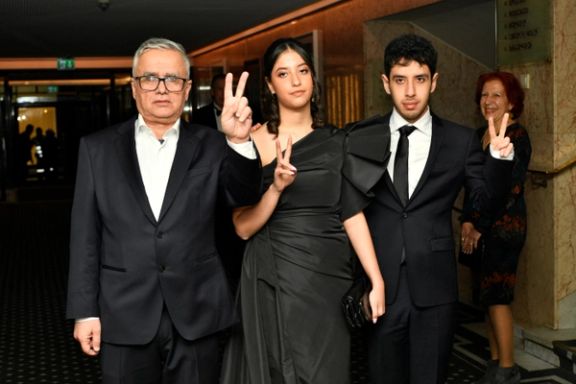
Her words seem to be directed at Western leaders who consider it to be wiser –or see no alternative but– to deal with those who rule Iran as long as they’re in control.
“The policies and strategies of Western governments have been too superficial to give priority to the will of the Iranian people to achieve their goals,” Mohammadi said.
The Norwegian Nobel committee awarded Mohammadi for her "fight against oppression of women in Iran" and the promotion of human rights for all, in what has been read by some as a decision to aggravate the regime in Tehran.
Narges Mohammadi has spent much of the last decade in prison, serving multiple sentences on charges including spreading propaganda against the Islamic Republic. She was symbolically represented on stage in Oslo by a portrait of her and an empty chair.
Mohammadi’s husband, Taghi Rahmani, and their twins –who live in exile in France– attended and received the reward on her behalf.
The event, supposedly a universal source of joy for Iranians, became yet another trigger for heated debate on social media when Rahmani said in an interview on the sidelines of the ceremony that Iranians inside Iran do not want sudden change.
Some read this as a statement in support of Reformists and attacked Rahmani, accusing him of betraying his wife’s suffering and promoting the regime’s agenda.
Others, including some prominent voices on social media whose loved ones have been killed by the regime in recent years, created a double-hashtag (which would translate in English as #DeathToIslamicRepublic and #DeathToReformMovement) with no reference to Rahmani but coinciding with the event.
Taghi Rahmani, a renowned journalist and political activist, had spent more than 13 years in prison before he left Iran in 2012. He’s been a vocal critic of the Islamic Republic for many years but believes any sudden political change in Iran to be a “strategic mistake.”
Unlike his Nobel winning wife, Rahmani used his platform Sunday to decry foreign influence, citing the examples of the 2003 invasion of Iraq and President Donald Trump’s unilateral abandonment of the JCPOA nuclear agreement with Iran.
Mohammadi, although vague in her language, seemed to be welcoming –or even encouraging– outside help in her Nobel speech.
“It is expected that the global civil society provides more tangible support to the Iranian people's efforts towards democratic and non-violent transition to achieve peace, democracy, and human rights.”
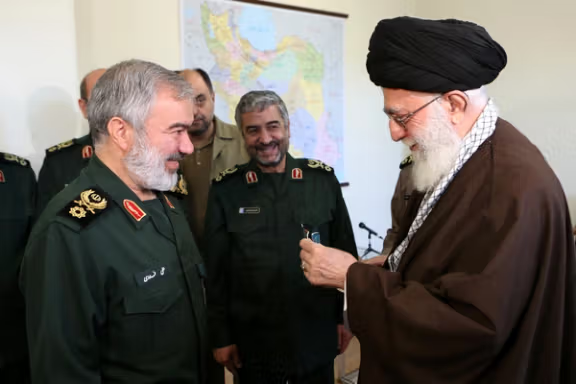
The IRGC is indifferent to who becomes Iran's next president or the outcome of parliamentary elections in March, its deputy commander Ali Fadavi has said.
During a speech at Jondi Shapur University in Ahvaz, Khuzestan Province, Fadavi emphasized that the crucial aspect for the IRGC is that the Iranian people heed Supreme Leader Ali Khamenei's directive to participate in the elections.
The implications of Fadavi's statement remain unclear. It could suggest that, like many Iranian media outlets and politicians, the Guards recognize the futility of holding elections that lack freedom, fairness, and competitiveness. Alternatively, it might indicate that the IRGC is withholding support for any specific candidate.
Fadavi's subsequent remark, "The IRGC is not going to sacrifice its reputation for any individual," implies a lack of faith in the merits of any candidate and underscores the IRGC's perceived supremacy over Iranian politicians. He asserted that while individuals may sacrifice themselves for the IRGC, the organization will not sacrifice itself for anyone.
Elsewhere in his speech, Fadavi elaborated that "We will not spend anything for anyone who would want to become the President or a member of the parliament, because the issue is not important at all."
During the past week, as the date for the parliamentary (Majles) elections gets closer, many politicians have said that Iranians do not care about the upcoming elections and that the turnout could be even lower than in the 2020 parliamentary vote and the 2021 presidential elections which were the lowest during the past 45 years.
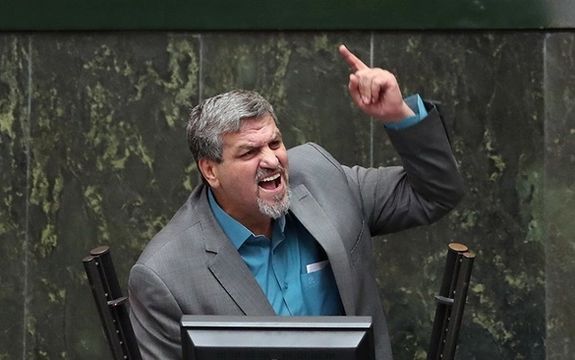
Former reformist lawmaker Mostafa Kavakebian said in his Student Day speech that most university students do not know that this is an election year. Earlier, prominent conservative politician Hamid Reza Taraghi had said the same thing about the population as a whole.
While moderate and pro-reform politicians in Iran have lost all hopes in the competitiveness of the upcoming election, only hardliners and ultraconservatives appear to take it seriously.
Even within the conservative camp, divisions are so deep and widespread that moderate and traditional conservatives such as former Majles Speaker Larijani and Expediency Council member Mohammad Reza Bahonar are not so sure that they could get through biased vetting by the Guardian Council. Of the two politicians, the former is not running, and the latter has openly said that he fears disqualification.
Meanwhile, conservative commentator Mohammad Mohajeri has said that major conservative groups are not so keen to forge strong alliances ahead of the elections as they are almost certain that the ultraconservative Paydari Party will betray them at the last moment as it has done in previous elections. As a result, every major hardline conservative group and party is likely to present its own separate list of candidates.
This would mean an even lower turnout than previous rounds and less credibility for the Majles, as those who eventually win the elections are likely to win smaller number of votes. Without a strong coalition to rally voters behind a group of candidates, few are likely to win more than a few hundred thousand votes even in big cities such as Tehran, Mashhad, and Esfahan.
Mohajeri further said that the main competition in the parliamentary elections will take place between Paydari and the supporters of current Majles Speaker Mohammad Bagher Ghalibaf. He added that regardless of reports about a coalition between Ghalibaf and Paydari, the former is making preparations for a campaign without a coalition, presumably due to Paydari's unpredictability.
Meanwhile, speaking about the possibility of former President Hassan Rouhani uniting low-key moderate and reformist candidates to win a sizeable minority in the next Majles, conservative politician Ali Yousefpour expressed doubts. He argued that Rouhani has lost his credibility among the voters due to his failure to sort out the country's economic problems during his presidency.